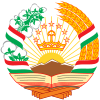Women in Tajikistan
Tajikistan is a country in Central Asia, with a population formed largely of Tajikistani (84.3%), with a significant Uzbek minority of 13.8%, and smaller numbers of Kyrgyz, Russians, Turkmens, Tatars, and Arabs.
For example, women who appeared in public without the traditional all-enveloping Muslim veil were ostracized by society or even killed by relatives for supposedly shaming their families by what was considered unchaste behavior.
In the late Soviet period, Tajik girls still commonly married while under-age, despite official condemnation of this practice as a remnant of the feudal Central Asian mentality.
[8] Another survey also found that women and men largely agreed that it was justifiable for a husband or mother-in-law to beat a wife/daughter-in-law who had "talked back", disobeyed, left the house without permission, had not prepared dinner on time, or had not cared for the children properly.
Focus was directed toward prevention, through addressing the causes, such as unemployment and instability that lead to violence and ensuring that legal and psychological assistance is provided to victims.
Rates of child marriage increased drastically during the civil war, when parents forced their daughters to marry, in order to protect their premarital chastity (that could be lost through rape, which could affect the 'reputation' of the family).
Fear of the girl remaining unmarried is another factor, which also encourages parents to arrange early marriages, since it is not socially acceptable for a woman to not have a husband.
[11] The Government of Tajikistan in August, 2019 announced the renewal of its reproductive health programme for a four-year period ending in 2027 afterwards Nairobi Summit made a commitment.
The programme of US$4.1 million is aimed at enhancing the accessibility, quality, and efficiency of reproductive health and family planning services focusing on the most vulnerable citizens who constitute over 75 percent of the population and mostly live in rural areas.
[13] The Gorno-Badakhshan Autonomous Region in the east of the country had the highest share of elected female deputies in rural jamoats at approximately 21.2%.
A study by the International Organization for Migration found that female border guards were considered much better than their male counterparts in detecting human trafficking cases, de-escalating conflict situations and identifying fraudulent documents.



